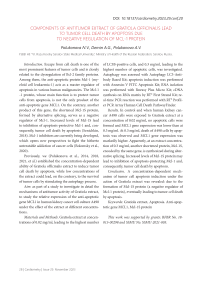Components of antitumor extract of Gratiola officinalis lead to tumor cell death by apoptosis due to negative regulation of MCL-1 protein
Автор: Polukonova N.V., Demin A.G., Polukonova A.V.
Журнал: Cardiometry @cardiometry
Рубрика: Conference proceedings
Статья в выпуске: 29, 2023 года.
Бесплатный доступ
Escape from cell death is one of the most prominent features of tumor cells and is closely related to the dysregulation of Bcl-2 family proteins. Among them, the anti-apoptotic protein Mcl-1 (myeloid cell leukaemia-1) acts as a master regulator of apoptosis in various human malignancies. The Mcl-1 -1 protein, whose main function is to protect tumor cells from apoptosis, is not the only product of the anti-apoptotic gene MCL1. On the contrary, another product of this gene, the shortened Mcl-1S protein, formed by alternative splicing, serves as a negative regulator of Mcl-1. Increased levels of Mcl-1S lead to inhibition of apoptosis-protective Mcl-1 and, consequently, tumor cell death by apoptosis (Senichkin, 2018). Mcl-1 inhibitors are currently being developed, which opens new perspectives to fight the hitherto untreatable addiction of cancer cells.
Gratiola extract, apoptosis, anti-apoptotic, gene mcl1, mcl-1s protein
Короткий адрес: https://sciup.org/148327392
IDR: 148327392 | DOI: 10.18137/cardiometry.2023.29.conf.20
Текст статьи Components of antitumor extract of Gratiola officinalis lead to tumor cell death by apoptosis due to negative regulation of MCL-1 protein
FSBEI HE “V.I. Razumovsky Saratov State Medical University”, Ministry of Health of the Russian Federation, Saratov, Russia
Introduction . Escape from cell death is one of the most prominent features of tumor cells and is closely related to the dysregulation of Bcl-2 family proteins. Among them, the anti-apoptotic protein Mcl-1 (myeloid cell leukaemia-1) acts as a master regulator of apoptosis in various human malignancies. The Mcl-1 -1 protein, whose main function is to protect tumor cells from apoptosis, is not the only product of the anti-apoptotic gene MCL1. On the contrary, another product of this gene, the shortened Mcl-1S protein, formed by alternative splicing, serves as a negative regulator of Mcl-1. Increased levels of Mcl-1S lead to inhibition of apoptosis-protective Mcl-1 and, consequently, tumor cell death by apoptosis (Senichkin, 2018). Mcl-1 inhibitors are currently being developed, which opens new perspectives to fight the hitherto untreatable addiction of cancer cells (Bolomsky et al., 2020).
Previously, we (Polukonova et al., 2014, 2018, 2021, et al.) established the concentration-dependent ability of Gratiola officinalis extract to induce tumor cell death by apoptosis, while low concentrations of the extract could lead, on the contrary, to the survival of tumor cells by stimulating the autophagy process.
Aim : as part of a study to investigate in detail the mechanisms of antitumor activity of Gratiola extract, to study the relative expression of the anti-apoptotic gene MCL1 in human kidney cancer cell culture A498 under the effect of the extract at different concentrations.
Materials and Methods. Gratiola extract at concentrations of 0.02 mg/ml, leading to the highest number of LC3B-positive cells, and 0.3 mg/ml, leading to the highest number of apoptotic cells, was investigated. Autophagy was assessed with Autophagy LC3-Anti-body Based Kit; apoptosis induction was performed with Annexin-V FITC Apoptosis Kit; RNA isolation was performed with Rneasy Plus Micro Kit; cDNA synthesis on RNA matrix by RT² First Strand Kit; real-time PCR reaction was performed with RT² Profiler PCR Array Human Cell Death PathwayFinder.
Results . In control and when human kidney cancer A498 cells were exposed to Gratiola extract at a concentration of 0.02 mg/ml, no apoptotic cells were formed and MCL1 gene expression was lower than at 0.3 mg/ml. At 0.3 mg/ml, death of A498 cells by apoptosis was observed and MCL1 gene expression was markedly higher. Apparently, at an extract concentration of 0.3 mg/ml, another shortened protein, Mcl-1S, encoded by the same gene, is synthesized during alternative splicing. Increased levels of Mcl-1S protein may lead to inhibition of apoptosis-protecting Mcl-1 and, consequently, tumor cell death by apoptosis.
Conclusion . A concentration-dependent mechanism of tumor cell apoptosis induction under the action of Gratiola extract was revealed: due to the formation of Mcl-1S protein (a negative regulator of Mcl-1 protein), eventually leading to tumor cell death by apoptosis.


